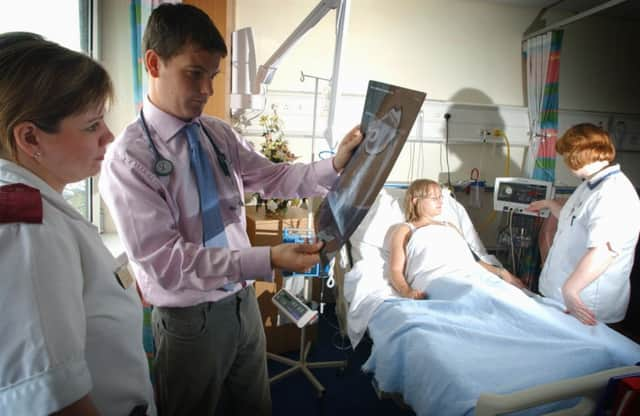Lyndsay Buckland: Hospital standards for stroke patients


Powerful TV adverts have shown the classic features that should mean we dial 999 for emergency help – weakness in the arms, drooping on one side of the face and slurred speech.
And the experts tell us that getting immediate help after suffering these symptoms can significantly improve rates of survival and reduce disability from a stroke.
Advertisement
Hide AdAdvertisement
Hide AdThese facts make the results of an audit of stroke treatment in Scottish hospitals published this week quite hard to fathom, because while it seems people do often act quickly after falling victim to a stroke, the treatment they receive from the NHS – and the speed at which it is delivered – vary widely depending on where you live.
The Scottish Stroke Care Audit found that even relatively simple measures, such as giving patients aspirin if they would benefit from this within a day of admission, were not routinely happening in every case.
Another key treatment – giving clot-busting drugs within an hour of arrival at hospital – also varied widely across the country, with 74 per cent receiving this in one hospital compared to 6 per cent in another.
And while standards state that 90 per cent of patients should be admitted to a specialist stroke ward within a day of admission, only in 82 per cent of cases did this happen.
The results mean that each year potentially thousands of patients are missing out on the highest standards of care to help improve their chances of survival and recovery.
It is true that across the standards measured in the audit performance has improved in the last year, on a Scotland-wide level at least.
However, the results for individual hospitals show in many cases there has been no improvement in the space of 12 months, and in some it may even have got worse.
The Stroke Association rightly labelled the postcode lottery of access to stroke treatment “unacceptable” and called for action across the board.
Advertisement
Hide AdAdvertisement
Hide AdMore than 12,500 people suffer a stroke in Scotland each year, and as with most illnesses this will probably rise with the ageing of the population.
The reasons behind differences in performance need to be urgently examined.
If one hospital can provide the standards of care we should expect, why should another down the road fail to do so?
But it should also be noted that not one hospital managed to meet all the standards, so clearly attention is needed on a nationwide basis.